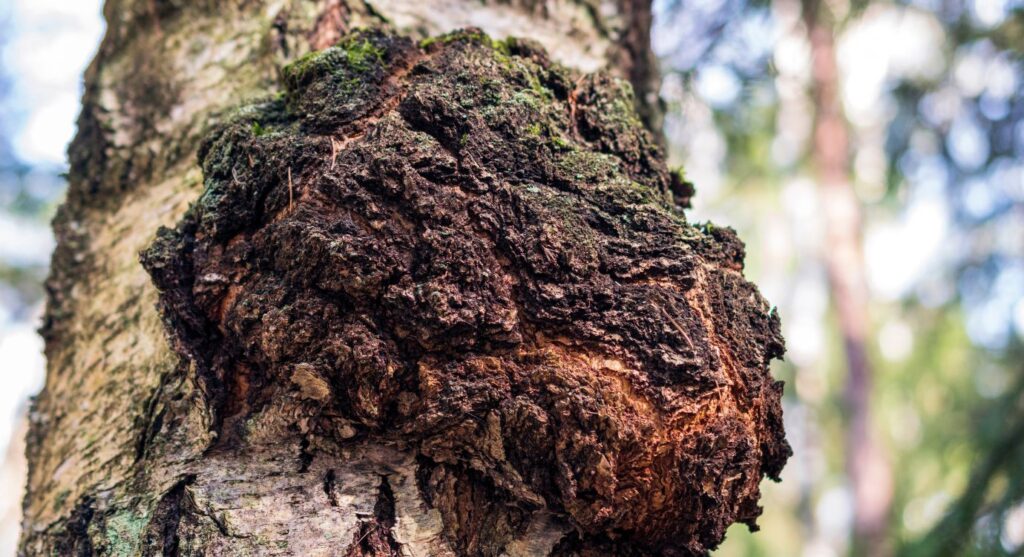Free delivery on all orders over £45
Free delivery on all orders over £45

Medically reviewed by
If you’re reading this, chances are you’ve heard about the amazing adaptogen known as Chaga mushroom.
This unique mushroom has been gaining popularity in recent years due to its numerous health benefits.
For centuries, Chaga mushrooms have been used in traditional medicine to treat various ailments, and now modern science is discovering even more potential benefits for our health.
In fact, the global Chaga mushroom market was valued at $712.6 million in 2021 and is expected to reach $1.4 billion by 2031.
But what exactly are Chaga mushrooms, and why are they so special?
In this blog post, we’ll dive into everything you need to know about Chaga mushrooms, including:
Let’s dive in.
Chaga mushroom, also known as Inonotus obliquus, is a type of fungus that grows on the bark of birch trees in cold regions such as Russia, Siberia, Korea, and some parts of North America.
Chaga mushrooms have a distinct appearance, with a black, charred-looking exterior and a rusty brown interior.
Fun fact, the black exterior of the Chaga mushroom is actually a result of the fungus producing a pigment called melanin, which you’ve probably heard of. Melanin gives it a dark, burnt appearance, and it is also thought to help protect the fungus from UV radiation and other environmental stressors.
Chaga mushrooms are rich in nutrients, including antioxidants, polysaccharides, beta-glucans, and other beneficial compounds. These nutrients have been shown to have various health benefits, including boosting the immune system, reducing inflammation, and protecting against certain types of cancer.
Traditionally, Chaga mushrooms have been used in folk medicine to treat a wide range of ailments, including digestive issues, respiratory problems, and skin conditions.
Due to its rise in popularity over the last decade, many people are now incorporating these magical fungi into their diets as a natural way to promote health and well-being.
Before we begin, you should know that Chaga mushroom is not a psychoactive substance, so it does not produce any feelings of euphoria or altered consciousness.
However, many people report feeling a sense of well-being and increased energy after consuming Chaga mushrooms.
Why is that?
This is because Chaga mushroom is rich in nutrients, including antioxidants and polysaccharides, which can help to boost the immune system and reduce inflammation in the body.
Numerous studies have also suggested that Chaga mushroom possesses adaptogenic properties, meaning that they can help the body to cope better with stress and improve overall resilience.

Chaga mushroom is packed with loads of components that can be beneficial to your health and well-being in many ways.
With that being said, some of the benefits of consuming Chaga mushrooms include:
Chaga mushroom has been shown to have a number of beneficial effects on the immune system.
One of the key ways that Chaga mushroom works to support the immune system is by stimulating the production of certain immune cells, such as T lymphocytes and natural killer (NK) cells.
T lymphocytes are a type of white blood cell that plays an important role in the immune response, helping to identify and attack foreign invaders like bacteria and viruses.
NK cells, on the other hand, are a type of immune cell that is particularly effective at destroying infected or abnormal cells, such as cancer cells.
Chaga mushroom also contains several polysaccharides and beta-glucans, which are types of complex carbohydrates that have been shown to have immunomodulatory effects. These compounds help to regulate the immune system, ensuring that it functions effectively without overreacting or attacking healthy cells.
In addition to its effects on the immune system, Chaga mushroom also has potent anti-inflammatory properties.
Inflammation is a natural response to injury or infection, but when it becomes chronic, it can contribute to several health problems, including arthritis, heart disease, and cancer.
This is where Chaga mushrooms come into the picture.
Chaga mushroom contains many bioactive compounds, including triterpenes and polyphenols, which have been shown to have anti-inflammatory effects.
These compounds work by inhibiting the production of inflammatory cytokines, which are proteins that can trigger and perpetuate inflammation in the body.
Read more: Mushrooms for inflammation

High cholesterol levels are a major risk factor for heart disease and stroke, so finding natural ways to lower cholesterol can be an important part of maintaining overall health.
One way that Chaga mushrooms may help to lower cholesterol levels is by inhibiting the activity of an enzyme called HMG-CoA reductase.
This enzyme is involved in the synthesis of cholesterol in the liver, and drugs known as statins are commonly used to block its activity and lower cholesterol levels.
Chaga mushroom contains some natural compounds that have been shown to inhibit HMG-CoA reductase, including betulin and betulinic acid.
These compounds can help to reduce the amount of cholesterol produced in the liver, leading to lower cholesterol levels in the blood.
In addition to its effects on HMG-CoA reductase, chaga mushroom also contains several other bioactive compounds that have been shown to have cholesterol-lowering effects.
For example, the Chaga mushroom is rich in antioxidants that lower cholesterol by reducing inflammation and oxidative stress in the body.
Finally, Chaga mushroom is also a good source of dietary fibre, which can help to lower cholesterol levels by binding to cholesterol in the digestive tract and preventing it from being absorbed into the bloodstream.
This can lead to lower levels of LDL (“bad”) cholesterol and higher levels of HDL (“good”) cholesterol, which can help to reduce the risk of heart disease.
In an 8-week scientific study carried out on rats, it was discovered that Chaga extracts reduced the amount of “bad” LDL cholesterol, total cholesterol, and triacylglycerols. In addition to this, it increased the antioxidant levels of said rats.
Chaga mushrooms are believed to have blood sugar-lowering properties, which is significant given that high blood sugar levels are a major risk factor for type 2 diabetes.
Chaga mushroom contains a number of natural compounds, including polysaccharides and beta-glucans, that have been shown to improve insulin sensitivity.
These compounds help to increase the uptake of glucose into cells, reducing the amount of glucose that circulates in the bloodstream and lowering blood sugar levels.
In a study in diabetic mice, the Chaga mushroom supplement caused a 31% decrease in blood sugar levels over a three-week time frame.
In addition to its effects on insulin sensitivity, Chaga mushroom also contains a number of other bioactive compounds that have been shown to have blood sugar-lowering effects.
For example, it is rich in antioxidants, which can help to reduce inflammation and oxidative stress in the body. Inflammation and oxidative stress are both associated with higher blood sugar levels, so reducing these factors can help to lower blood sugar as well.
Finally, Chaga mushroom has also been shown to inhibit the activity of alpha-glucosidase, an enzyme that is involved in the digestion and absorption of carbohydrates.
By inhibiting this enzyme, Chaga mushroom can help to slow down the absorption of glucose from the digestive tract into the bloodstream, leading to lower blood sugar levels.
The main takeaway here is the blood sugar-lowering effects of Chaga mushrooms are possibly due to a combination of factors, including its ability to improve insulin sensitivity, reduce inflammation and oxidative stress, and inhibit alpha-glucosidase activity.
Although rare, there are still certain side effects you may face when consuming Chaga mushrooms.
Nevertheless, the good thing is most of these side effects are easily avoidable if you take the right precautions. The potential side effects of Chaga mushrooms include:
It’s important to note that many of these side effects have only been reported in isolated cases or animal studies.
So, if you’re considering taking chaga mushroom supplements or extracts for its health benefits, it’s always a good idea to talk to your healthcare provider first, especially if you’re taking medications or have a pre-existing medical condition.
You can consume Chaga mushrooms in various forms, including as a tea, supplement, tincture, or powder. Regardless the method you choose, its best to start with a low dosage and gradually increase it.
Chaga mushroom tea is one of the most popular ways to consume Chaga.
To make Chaga mushroom tea, boil water and add a piece of chaga mushroom. Allow it to simmer for at least 20 minutes or up to several hours to extract the beneficial compounds from the mushroom.
You can also add other ingredients like honey, cinnamon, or ginger to enhance the flavour.

Chaga mushroom supplements are available in capsule or tablet form. Follow the dosage instructions provided by the manufacturer.
Chaga mushroom tincture is made by soaking chaga mushrooms in alcohol or water for several weeks.
The liquid is then strained and bottled. To use a chaga mushroom tincture, add the recommended amount to water or another liquid and consume.
Chaga mushroom powder is made by grinding dried chaga mushrooms into a fine powder. You can add the powder to smoothies, juices, or water.
In conclusion, Chaga mushrooms are a fascinating and unique fungus with a range of potential health benefits.
Their rise in popularity over the last decade can be attributed to their immune-boosting, anti-inflammatory, and cholesterol-lowering properties.
Although Chaga mushrooms are generally considered safe for consumption, it’s important to consult with a healthcare professional before incorporating them into your diet, especially if you’re pregnant, breastfeeding, or taking medication.
Overall, Chaga mushrooms have a promising future in the world of natural health remedies and are definitely worth considering if you’re looking to improve your overall health and well-being.
10% off on your first order
Complete this one-minute quiz and find the right products for you.
Sign up for the Evopure newsletter:
This product is not for use by or sale to persons under the age of 18. It should not be used if you are pregnant or nursing. Consult with a physician before use if you have a serious medical condition or use prescription medications. A Doctor’s advice should be sought before using this and any supplemental dietary product. This product is not intended to diagnose, treat, cure or prevent any disease.
© Evopure Ltd. All rights reserved Terms & Conditions Cookie Policy Sitemap